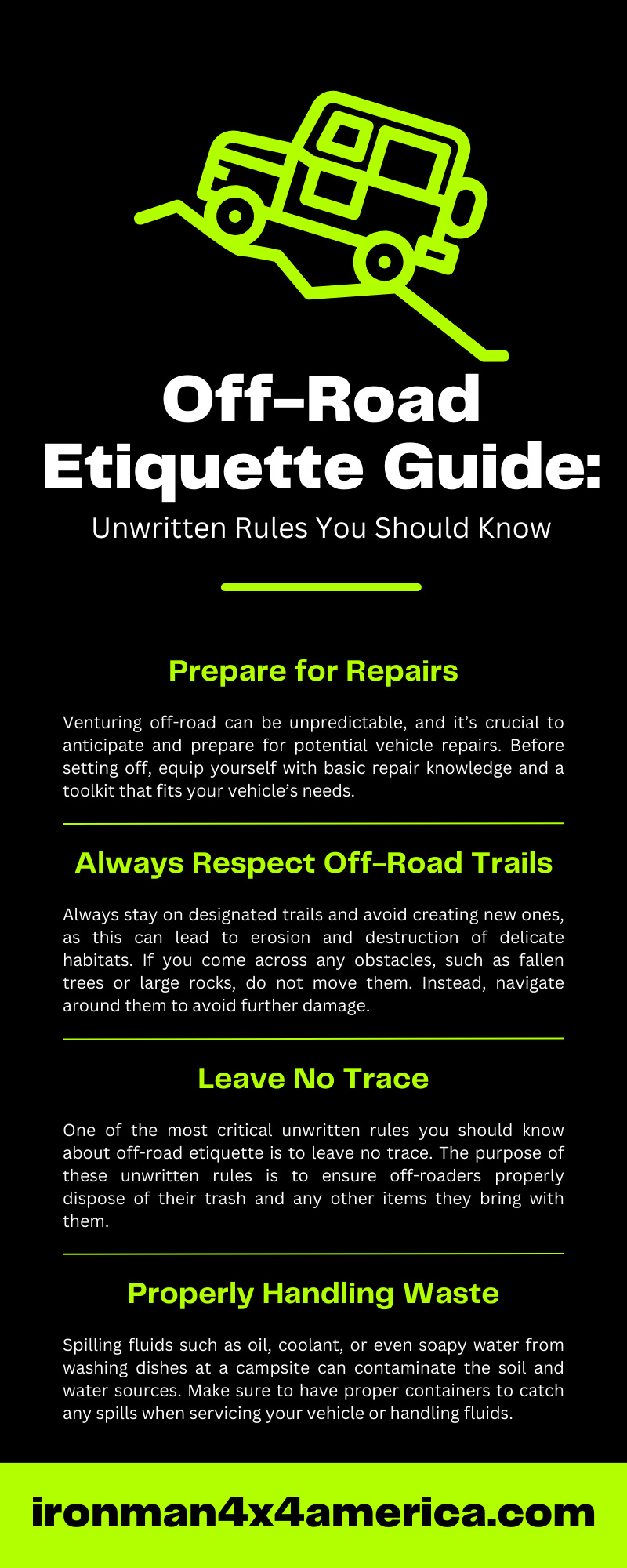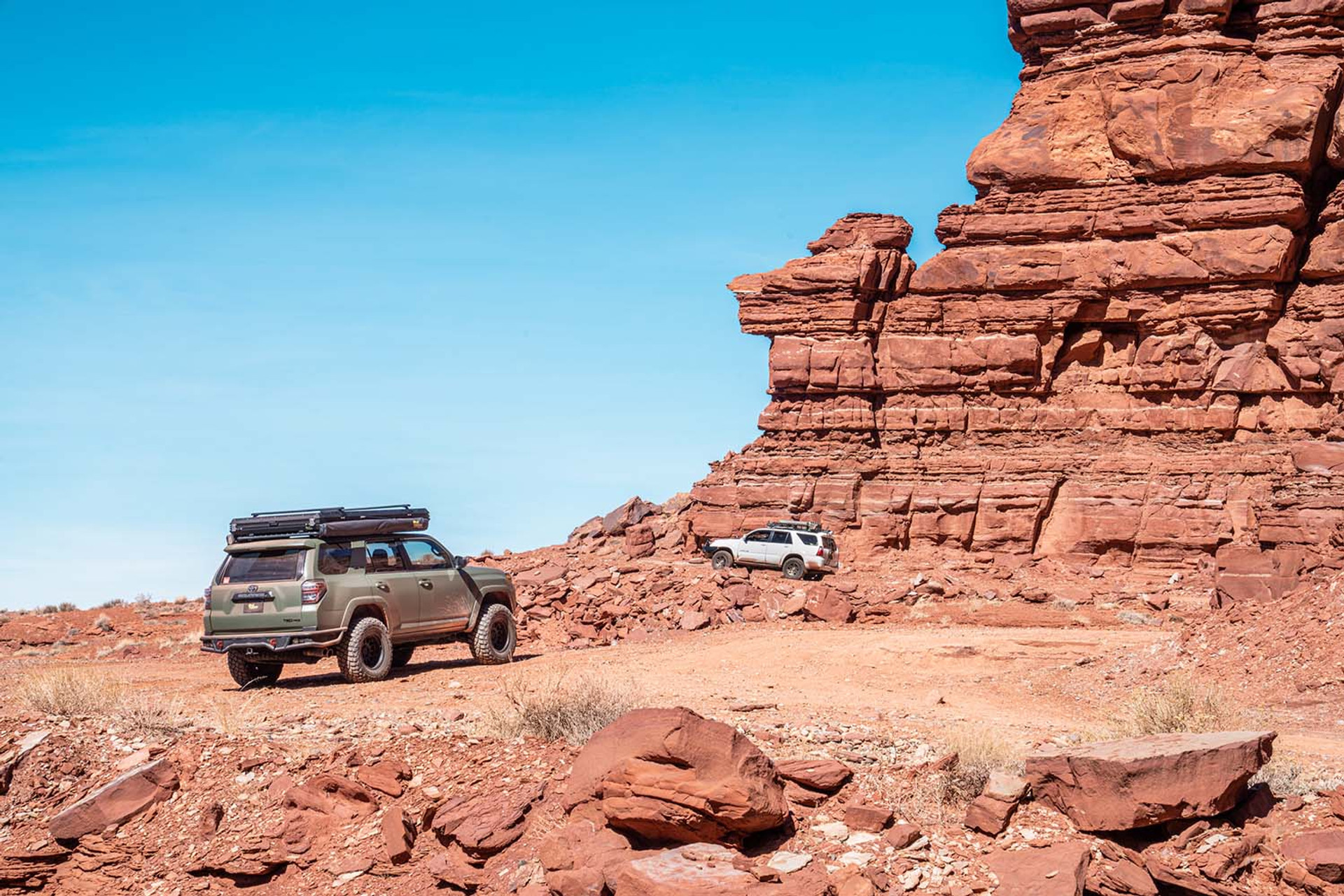Off-Road Etiquette Guide: Unwritten Rules You Should Know
Off-road driving is incredibly fun, but it also comes with a set of unwritten rules you should know. Our off-road etiquette guide will give you a closer look at the steps you can take before and during your trip to have a responsible and exciting excursion. These rules ensure the safety of everyone involved, but they also protect the environment and maintain trails for future use. By becoming a responsible off-road enthusiast by following this list of unwritten rules, you set a positive example for others to learn from.
Prepare for Repairs and Recoveries
Venturing off-road can be unpredictable, so it’s crucial to anticipate potential vehicle repairs. Before setting off, equip yourself with basic repair knowledge and a toolkit that fits your vehicle’s needs.
This kit should include items such as basic tools, a tire patch kit, jump pack or jumper cables, spare fuses, and more. In addition, bring vehicle recovery gear like a sturdy shovel, recovery boards, tow strap, kinetic strap, a few soft and hard shackles, as well as a pair of heavy-duty gloves.
Accidents can happen on the trails, so prepare with the right hardware. At Ironman 4x4, we offer 4x4 off-road products that include electric winches, recovery boards, air compressors, leather gloves, and other types of gear that will help you facilitate safe and successful vehicle recoveries. Get familiar with your recovery equipment at home first, so you can understand how it all works before using it on the trails.
Of course, the idea is to not have to repair or recover a vehicle. Some of things you can do to prevent this include:
- Always keep a safe distance from the vehicle in front of you and allow for sudden stops of obstacles.
- Maintain a safe speed suitable for the terrain, visibility, and your driving ability.
A few other off-road driving best practices include:
- Keep your vehicle doors and windows closed to prevent personal injury. This will also minimize dust, dirt, and mud getting into the vehicle.
- Secure loose items inside the vehicle to prevent them from falling out. Making sure items are secure also prevents things from becoming projectiles should you need to stop quickly or if the vehicle were to tilt. This helps prevent injury and damage to the vehicle’s interior or glass.
Always Respect Off-Road Trails
Off-road trails grant travelers a closer look at remote and untouched surroundings. However, venturing off the established trails is something you should avoid.
Always stay on designated trails and avoid creating new ones, as this can lead to erosion and destruction of delicate habitat. Staying on the trails will help you embrace the outdoors without disrupting local wildlife or putting yourself in danger. It also helps to reduce the opportunity for trails to be closed due to misuse. The bottom line? Always stay on the trail.
Ironman 4x4 is also a member of Tread Lightly! This non-profit organization leads initiatives to promote the responsible use of motorized vehicles when recreating outdoors. It educates, trains, and has a goal of balancing off-road users’ needs for adventure, with the need to conserve the places they go.
Leave No Trace
One of the most critical unwritten rules you should know about off-road etiquette is to leave no trace. In fact, there are many Leave No Trace principles you should learn before your next trip. The purpose of these unwritten rules is to ensure off-roaders properly pack out their trash and any other items they bring with them. Leaving trash behind is not just unsightly and disrespectful—it can also pose a threat to wildlife that may ingest it. And again, litter and garbage are other reasons trails get closed to the public. So always pack out all of your trash. This includes drink containers, food wrappers, cigarette butts, and pretty much anything else you bring with you.
Properly Handling Waste
Drivers also need to properly dispose of oil or other fluids from their vehicles. Keep in mind that even small amounts of oil or other chemicals can have a significant impact on the environment, so it’s essential to properly discard them. Spilling fluids such as oil, coolant, or even soapy water from dirty dishwater at a campsite can contaminate soil and water sources. Make sure to have proper containers and methods to catch spills when servicing your vehicle or handling fluids.
Plus, make sure to secure the cargo in your 4x4 truck bed so it doesn’t accidentally fall out and contaminate the environment while you drive. Ironman 4x4 offers electric tonneau covers that fit over truck beds that provide hands-free operation, ensuring conveniently accessible cargo when necessary.
It’s also important to manage human waste responsibly. If facilities aren’t available, bury human waste at least 200 feet from water sources, trails, and camp areas and at dig least six inches or more deep. Alternatively, Waste Alleviating Gel (WAG) bags or other human waste matter bags are available on the market to pack out human waste, which is the best option.
By adhering to Leave No Trace principles, you ensure that your favorite off-roading areas remain pristine and enjoyable for future generations.
Respect Everyone on the Trail
Off-roading is not the only activity that takes place on trails. It’s crucial to respect other trail users, including hikers, cyclists, and horseback riders, in addition to wildlife and the terrain.
That way, everyone’s experience remains enjoyable. Drivers should yield to individuals not in motorized vehicles. When encountering hikers or cyclists, reduce speed considerably and pass with care, providing them ample space to continue their activities safely. When you approach anyone with a horse, it is advisable to stop your vehicle entirely until they pass, as horses can spook easily.
Vehicles going uphill typically have the right of way to navigate through a narrow pass unless it’s cliff-facing. It’s best to navigate through tricky trail sections with those around you so everyone remains safe.
It’s also good to let oncoming traffic know how many are in your group by visual or audio clues. Holding up your hand indicating three trucks, or five SUVs can help others determine their path beyond your party in a safe manner.
Don’t Underestimate Your Limits
Off-roading, by its very nature, involves conquering challenging terrain that pushes the boundaries of the driver and the vehicle. Recognizing your driving limitations is a fundamental principle to adhere to for any off-roading adventure. There’s no need to push yourself or your vehicle beyond safe limits.
Practicing driving skills and equipping your vehicle with the right equipment will make a big impact on trail trips. It’s crucial to prioritize safety over thrill. By being aware of your limits and respecting them, you’ll ensure a safer off-roading experience and enjoy the journey much more.
At Ironman 4x4, we have high-quality skid plates, front bumpers, rock sliders, and other off-road accessories available, ensuring you can upgrade your vehicle while treading lightly and leaving no trace.


